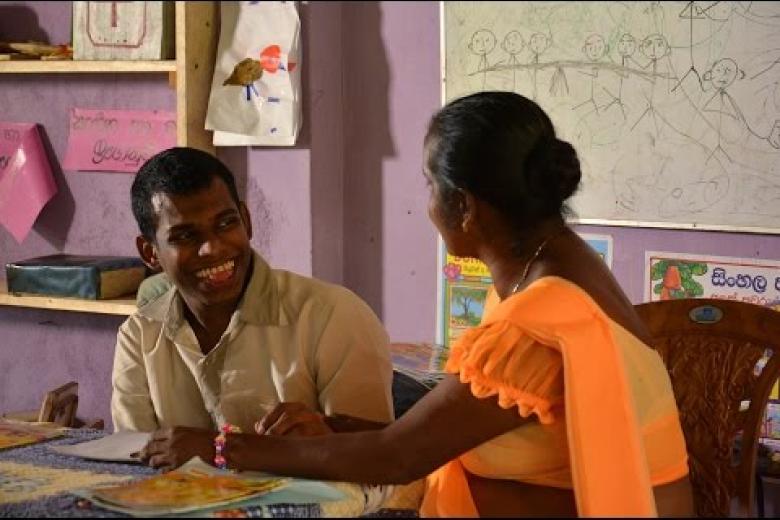In preschool at 24

Indunil is 24 and is thrilled that he could finally enter preschool this year. He wouldn’t miss school for anything. His little friends in the class call him ‘Big Brother’. They learn new letters together, draw and colour and paste.
Watch Indunil's video
“They all love him very much,” says Latha, his Preschool teacher, “Even from the first day he joined they never felt he was different. In fact, the children have been very supportive to him. When they finish their work they always come to his table to help him with his work. They all wait for him before starting morning activities.”
When World Vision started to work in Neluwa (South Sri Lanka) Latha and the other preschool teachers raised the lack of education opportunities for children with disabilities as one of the biggest issues in the area.
“It is strange we didn’t identify this issue until we were at a teacher training coordinated by World Vision,” says Latha, “The training had a special section on identifying children with special needs and how to support them. We were so surprised that such children should even attend a school that we inquired about it from World Vision. That is when we learnt that even though disabled, they too have a right to education.”
"We realized that there were also a large number of young people with special needs in our area who have not had the opportunity to go to school."
The teachers were excited about supporting the inclusion of 5-year-old children with special needs in their preschools that they visited their homes and encouraged parents to bring them to preschool.
“During our visits to homes we realized that there were also a large number of young people with special needs in our area who have not had the opportunity to go to school since there was no special education unit in any of the schools. Some have challenges in mobility,” says Latha, “We brought this up with World Vision and discussed homeschooling as an option. Preschool teachers could use time after the preschool to visit them at home and teach them.”
Eleven preschool teachers volunteered and were especially trained by the Social Services Department and each teacher was assigned one or two children from their own villages. A Social Services Officer works with them in identifying each child’s need and the way they should support them.
Indunil fell under Latha’s care.
“Initially, he wasn’t open to the idea of working with me. But soon we got along. I felt that he could improve if he had the chance to be with new people outside his family. Preschool was the best place to start, so I spoke about my idea to the parents of the other children who were in my class. They were hesitant but agreed to give Indunil an opportunity as long as it didn’t interrupt their children’s education.”
"I see a big improvement in him since this programme... I have a lot of hope for him now."
Since the time he joined, the preschool Indunil has made remarkable progress.
“I always wanted to educate him, but had to abandon the idea when traveling to a special education unit became too big a challenge,” says Indunil’s mother, “I see a big improvement in him since this programme. He is more joyful and speaks more words and is able to do all his work on his own at home. He likes to look at books and papers and asks me when he doesn’t understand a picture. I have a lot of hope for him now.”
Just like Indunil, every child under the homeschooling programme has made progress. Each teacher provides a monthly progress report of each student under their care to the Social Services Unit and discusses how to further support the students.
Meanwhile, World Vision Neluwa Programme area began to work towards obtaining a special education unit in at least one of the schools in Neluwa. The idea was alien to the principals and teachers in the schools. They were afraid that the unit would put school’s reputation at stake and they would lose regular students.
In order to sensitise them to inclusive education, World Vision organized a visit to a school with a special education unit and provided them the opportunity to talk to the teacher in charge and the principal of the school.
